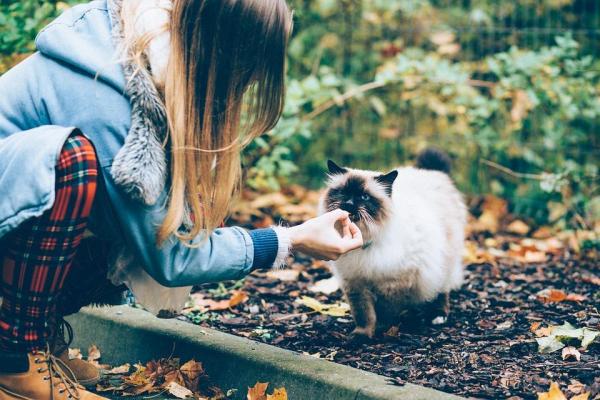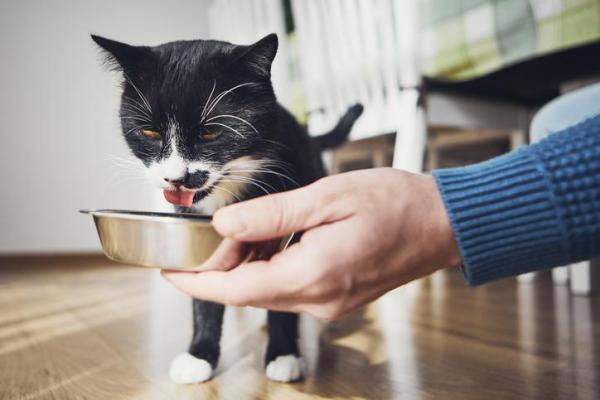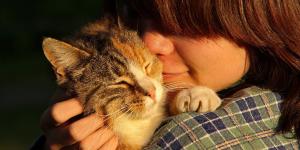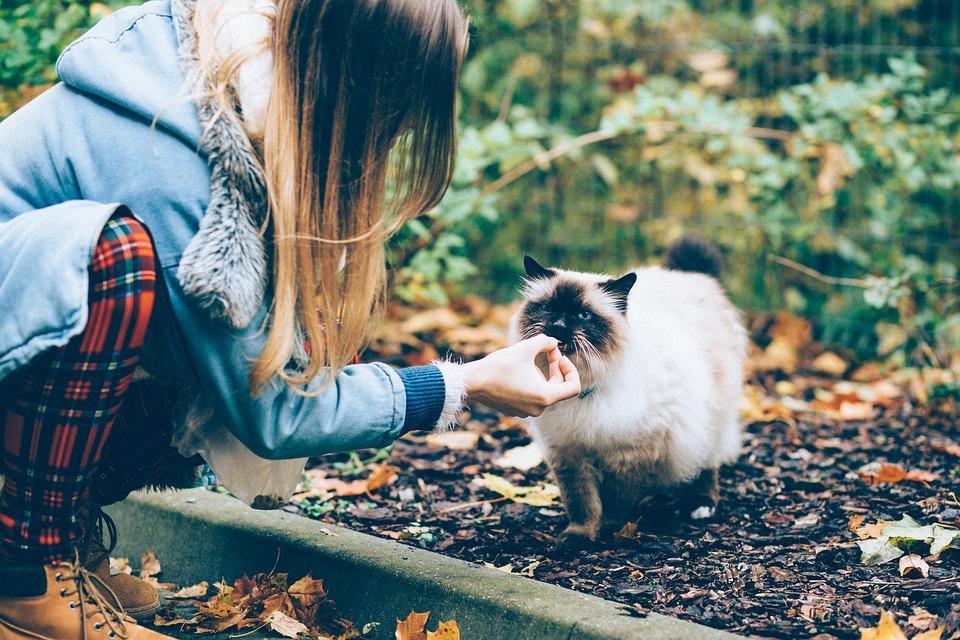How Do Cats Choose Their Human?



See files for Cats
You may heard it said that cats choose their humans, not the other way around. We may have spent a lot of time considering what cat might best suit our needs, perhaps the decision wasn't down to us in the end, at least not entirely. There is truth the maxim that cats choose their owners. They are intelligent and independent animals. Although they are also social and in need of company, they will not want to feel forced to live with anyone and may leave if they feel uncomfortable.
This is why AnimalWised asks how do cats choose their humans? We delves deeper into the relationship between people and felines, and provide information on why cats choose a favorite person.
What is the relationship between cats and humans?
One of the most important considerations we need to make in regards to the human/feline relationship is related to terminology. While there is an important legal factor, it is important to know that cats do not have an ‘owner’. The term when applied to cats is misleading since they are a living thing, not a commodity. While it is not correct to say they have the same awareness as we do, they do not perceive themselves as an object owned by anyone.
This lack of ownership relates to the cat in that they don't have an obligation to stay. They are social animals who need companionship in order to feel comfortable and save. For this reason, cats choose their living companions. You may be able to prevent this by keeping them locked in your home. But a cat which doesn't have security will not truly bond with a human.
For a cat, their human family can act as providers, friends, guides and reference points, but not masters. This is why we generally refer to humans as guardians in relation to companion animals.
This can be seen from the very onset of feline domestication. There is solid evidence to suggest that cats were not domesticated by humans, but instead domesticated themselves[1]. They chose humans to be a provider since they had warmth, food and other provisions available to them. Cohabitation appears to be based on mutual benefit. The benefit to us is the affection and companionship cats provide, among others.
This can be contrasted with the relationship humans have to dogs. Although they have the same basic animal welfare rights, canines are more dependent on humans and need a master for education, training and well-being.
Having clarified the terminology, we need to understand a cat who is not comfortable with their human family will leave to find a more favorable environment. When this is not possible, behavioral problems will arise. In many ways this is comparable to how we would leave contact with someone if our relationship with them is unrewarding and negative.
How do cats choose their companions?
By this point, if you are in guardianship of a cat, you may be wondering if you meet the correct criteria. The best way to affirm this is to check on the well-being of the cat. If they have their needs covered both physically and emotionally, they are unlikely to have any desire to leave.
The physiological needs are something which cannot be overlooked. A proper diet is vital. This diet needs to be specific to the individual, taking into consideration their age and health status. If a cat is not given the appropriate diet, it is not uncommon to see them escape to a neighbor in search of it. Although cats still maintain a hunting instinct, domestication has made them reliant on us for these needs.
Just as important is the need for a stable environment, something which affects both physiological and psychological well-being. Cats are territorial animals, so they need to feel safe from external threats. They need somewhere to perform bodily functions, rest appropriately and also to keep them cognitively stimulated. All this needs to happen in a calm environment conducive to well-being, not stress.
Our article on reasons why your cat is stressed can help elucidate what environmental factors need to be controlled.
A cat's social needs need to be covered in the home. Although they have an independent nature, they require company. This can come from other cats, humans or a combination of the two. The different members of their family group may fulfill different roles and some cats may choose favorites. However, if anyone is causing them stress, this needs to be addressed.
The social factor which can cause the most stress is the arrival of a new group member. Whether this is a new baby, a new cat or a different pet altogether, their arrival can impact the cat's feeling of security. The new arrival may be seen as hostile, especially if they pose a threat to their existing resources on which they rely completely. A progressive and appropriate introduction will be required in these situations, something you can learn about in how to help a cat accept another.

The above factors are usually the most decisive when it comes to knowing how cats choose their human companions. You may have noticed you cats likes to spend more time with certain people over others. This is due to the fact that cats prefer people who known how to interact properly with them. A good cat companion can be characterized as someone who:
- Relates to them as cats: it is a mistake to treat a cat as a human being. Although they are family and need affection, we shouldn't put the same expectations on them, otherwise we often end up treating them badly.
- Respects their boundaries: although we might want to show a cat some love, many will be upset if we don't respect their limits. We need to check their body language for signs of discomfort and not force interact when they don't want it. The latter can commonly seen when cats are picked up against their will.
- Makes positive associations: cats notice which members of their family make positive impressions. For example, someone who spends more time playing with them is more likely to become a favorite than someone who only interacts when they want something for themselves.
- Avoids punishment: people who lose patience with their felines will negatively affect their bond. We should never scold or yell at a cat, especially after they have done a deed perceived as bad. Physical aggression will be poorly interpreted and can place a divide in your relationship which is difficult to breach. Cats are particularly sensitive to these experiences. Most effective and beneficial to the cat is to use positive reinforcement and redirect behaviors which we do not want to tolerate, such as scratching objects in the home.
How many owners does a cat have?
As we have explained above, a cat doesn't have owners or masters. They have companions with whom they share their lives. If we recalibrate the question, it might be better to ask how many favorite humans does a cat have? We need to understand these favorites in context of a cat's familial relationships.
Cats can have more than one favorite. They may show particular affection to a single person, but they should bond well with those with whom they have positive experiences. Some factors are out of our control. For example, if a cat was abused by men, they may associate them with trauma and prefer to have only females as their favorite. Even in these cases, we can try to bring them round through positive reinforcement.
The important thing to remember that all cats are individuals. They will have personal preferences which may be difficult to discern, but they are still valid. We need to relate to them properly and establish a healthy bond. When the cat feel safe and secure, they are more likely to have more than one companion
If you still think there is a negative reason why a cat does not accept you as a favorite, take a look at our article on why cats prefer some people over others.

How to help your cat love you
If you live with a cat and notice they appear to shun you over others, it is possible their physiological needs are met, but their emotional needs are left wanting. The first thing we need to do is not be self-conscious. It doesn't need to be a reflection on our self-worth and it is counterproductive to vie for affection in competition with others. What we need to do is understand out cat's proclivities as an individual.
Cats often tend to be cold with us when we are excessively affectionate. We may want to pet them at times when they prefer to be alone or play with them when they are trying to rest. For this reason, we need to learn a cat's body language. Even if we think they may be receptive to interaction, they may be showing signs they are unhappy. We should wait until we see signs they are happy, otherwise they may be overwhelmed and even lash out.
Each cat is a unique individual, even if we are considerate of general feline traits and behaviors. Some cats may be particularly calm and affectionate, others may have lots of energy and behave more independently. Finding the most appropriate way to interact with your cat requires you to get to know your cat in the first place. Building this bond will help you towards becoming their favorite because they will recognize the effort. Knowing how much they want to play, where they want to be petted and anything else pertinent to your relationship is vital.
Also, try not to be the one who always initiates interaction. Look at the moments in which your cat approaches you and seems to be responsive to being touched. You can encourage your cat to want to spend time with you by rewarding them positively when an interaction goes well.
Finally, if you live with more than one person in the home, you may see your cat is more comfortable with another person than yourself. Observe how they interact together and even ask them for advice. In this way, you may be able to pick up specific tips on how to best relate to your cat.
In short, knowing what your cat needs from a human companion and catering to them will help you to become their favorite. However, if we live with other people we also need to leave jealousy behind and learn to help everyone live together harmoniously. If you need some additional practical help, take a look at our video below on how to gain a cat's trust:

If you want to read similar articles to How Do Cats Choose Their Human?, we recommend you visit our Facts about the animal kingdom category.
1. Driscoll, C. A., et al. (2007). The Near Eastern Origin of Cat Domestication. Science, 317(5837), 519-523.
https://science.sciencemag.org/content/317/5837/519.abstract







